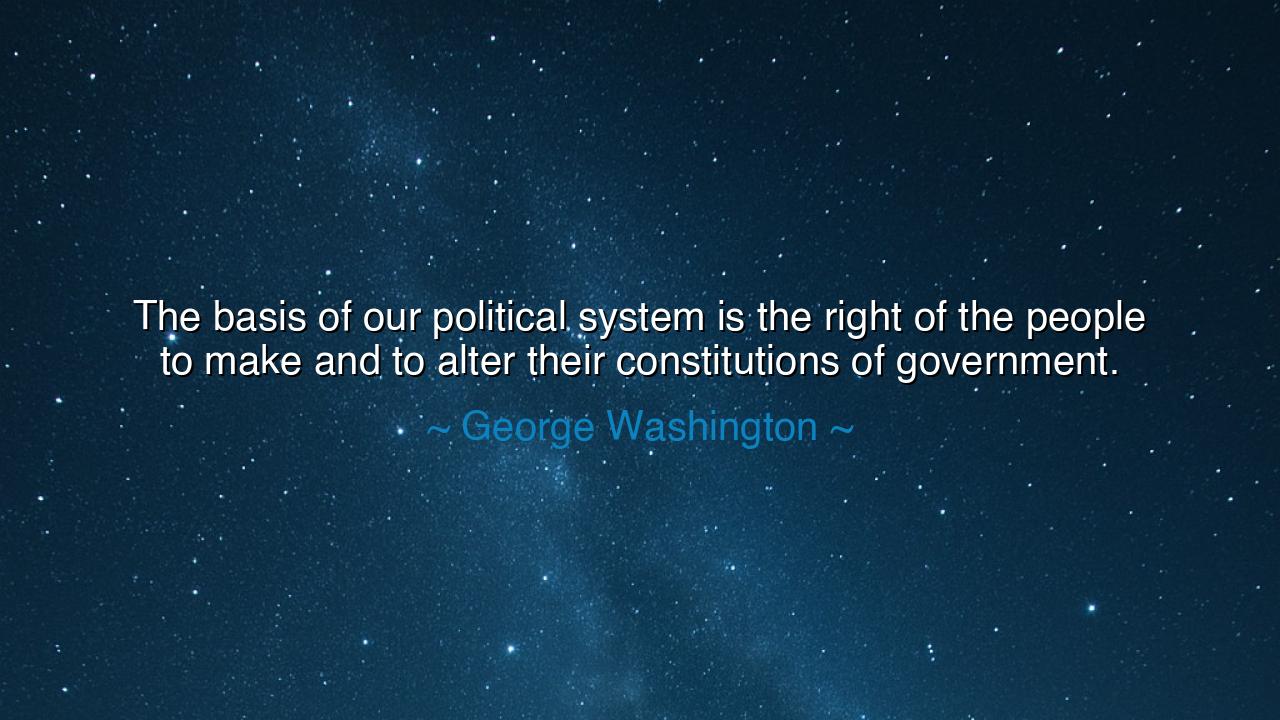
The basis of our political system is the right of the people to
The basis of our political system is the right of the people to make and to alter their constitutions of government.






"The basis of our political system is the right of the people to make and to alter their constitutions of government." Thus spoke George Washington, the father of a new nation and the guardian of its founding spirit. His words are not merely those of a statesman but of a prophet — spoken with the solemnity of one who knew that freedom, once born, must be nourished by the will of those it serves. In this declaration lies the cornerstone of democracy itself: that the people, not kings nor councils, hold the sacred authority to shape, renew, and redefine their own government. Washington’s voice rings across the ages, reminding every generation that liberty endures only where the governed remain its architects.
When George Washington uttered these words, the young American republic stood fragile and uncertain. The Constitution had only recently been ratified; the Revolution’s fire had cooled into the delicate task of building order from freedom. Many nations before had won their independence only to lose it again — for though they had driven out tyrants, they had failed to guard against tyranny’s return in new form. Washington understood this truth. He knew that the power to make and to alter government must forever belong to the people themselves, or else freedom would become merely another throne upon which new masters might sit.
In his Farewell Address of 1796, from which this quote is drawn, Washington sought to pass down more than wisdom — he sought to pass down responsibility. He had seen firsthand how fragile human virtue could be when tempted by ambition. Thus he warned that the true foundation of America’s political system was not in its armies or its laws, but in the sovereignty of the people, guided by conscience and informed by reason. The Constitution, he said, was not a relic to be worshiped blindly, but a living covenant, a tool of self-government to be adapted as wisdom grew and as time demanded.
The meaning of Washington’s statement reaches into the very heart of human dignity. For in declaring that the people have the right to make and alter their constitutions, he affirms that the governed are not the property of rulers, but free souls capable of reason, virtue, and consent. No generation may bind the next in chains of law that cannot be changed; no government may claim eternal authority over a people who have the power to choose anew. The will of the people — expressed through deliberation, justice, and the peaceful mechanisms of reform — is the lifeblood of liberty. When that will is silenced, when power becomes rigid and unaccountable, the republic begins to decay.
History abounds with examples of this truth. Consider the fate of ancient Athens, the cradle of democracy, where citizens once governed themselves in open assembly. When they grew complacent and allowed demagogues to twist their will, their democracy gave way to tyranny. Or look to the revolutions of Europe, where kings ruled by divine right, until oppressed peoples rose up to reclaim the power that was always theirs. Even in America, the great test of this principle came with the Civil War, when the Constitution was strained by the contradiction of slavery. It was through the moral courage of the people — through Lincoln’s appeal to the “better angels” of their nature — that the Constitution was altered again, aligning it closer to the promise of universal liberty. Thus, the right to change government is not chaos — it is renewal, the lifeblood of justice itself.
Washington’s wisdom also carries a warning: that this sacred right demands virtue. The people must not act in passion or ignorance, nor alter their constitutions for petty advantage or factional gain. Freedom without discipline becomes disorder; reform without wisdom breeds ruin. The power to alter government is holy, and must be exercised with reverence, for it shapes the destiny of nations and the lives of generations yet unborn. To wield it rightly, citizens must be educated, engaged, and guided by truth. A people who neglect this duty invite despotism, for when they cease to govern themselves, others will gladly govern them.
The lesson of Washington’s words, then, is both simple and profound: freedom is not a gift to be received, but a charge to be kept. Each generation must guard and renew its government, not with rebellion, but with reason; not with apathy, but with participation. Read, question, vote, speak — for silence is the grave of liberty. Let no law, no leader, no tradition stand above the people’s right to shape their destiny in accordance with justice and truth. For as Washington taught, the greatness of a nation lies not in the permanence of its rulers, but in the sovereignty of its people.
So remember, O listener, the eternal wisdom of George Washington: that the foundation of all just government rests upon the right of the people — the right to create, to correct, and to consecrate anew the institutions that serve them. Protect this right as you would protect your own life, for it is your life — the beating heart of freedom itself. And if you do, the republic shall never perish, for it will forever renew itself in the living hands of its people — governed not by fear, but by the enduring spirit of liberty.






AAdministratorAdministrator
Welcome, honored guests. Please leave a comment, we will respond soon